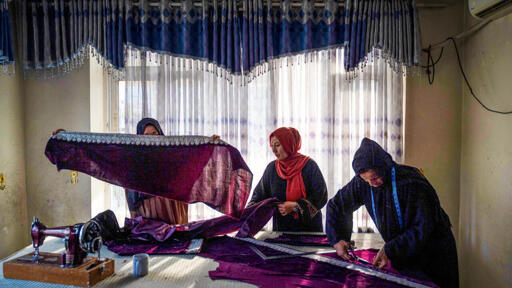Two-and-a-half years after putting 20,000 Afghanis ($300) earned from teaching sewing classes into a carpet weaving enterprise, she now employs around a dozen women who lost their jobs or who had to abandon their education due to Taliban government rules.
Ferozi is one of many women who have launched small businesses in the past three years to meet their own needs and support other Afghan women, whose employment sharply declined after the Taliban took power in 2021. Before the Taliban takeover, women made up 26 percent of public sector workers, a figure that has effectively decreased to zero", according to UN Women. Girls and women have also been banned from secondary schools and universities under restrictions the UN has described as “gender apartheid”.
Touba Zahid, a 28-year-old mother-of-one, started making jams and pickles in the small basement of her home in the capital Kabul after she was forced to stop her university education. “I came into the world of business… to create job opportunities for women so they can have an income that at least covers their immediate needs,” Zahid said.
While women may be making the stock, running the shops in Afghanistan remains mostly a man’s job. Saleswomen like Zahid “cannot go to the bazaar to promote and sell their products” themselves, said Fariba Noori, chairwoman of the Afghanistan Women’s Chamber of Commerce and Industry (AWCCI). Another issue for Afghan businesswomen is the need for a “mahram” – a male family member chaperone – to accompany them to other cities or provinces to purchase raw materials, said Noori. After 40 years of successive conflicts, many Afghan women have been widowed and lost many male relatives.
Despite these challenges, the number of businesses registered with AWCCI has increased since the Taliban takeover, according to Noori. The number went “from 600 big companies to 10,000” mainly small, home-based businesses and a few bigger companies, said Noori, herself a businesswoman for 12 years. “I am proud of every woman who is giving a hand to another woman to help her become independent,” said the 26-year-old.
the salaries ranging from 5,000 to 13,000 Afghanis, cannot cover all costs and many women are still stalked by economic hardship. Qamar Qasimi, who lost her job as a beautician after the Taliban authorities banned beauty salons in 2023, said that even with her salary she and her husband struggle to pay rent and feed their family of eight.
The closure of beauty salons was not only a financial blow, but also removed key spaces for women to socialise. Zohra Gonish decided to open a restaurant to create a women-only space in northeastern Badakhshan province. […] But starting her business in 2022, aged 18 was not easy in a country where the labour force participation for women is 10 times lower than the world average, according to the World Bank.
Aside from helping their families and having space to socialise, some women said work has given them a sense of purpose. Sumaya Ahmadi, 15, joined Ferozi’s carpet company to help her parents after she had to leave school and became “very depressed”. “(Now) I’m very happy and I no longer have any mental health problems. I’m happier and I feel better.”



That is a pretty fucked sentiment to post here, bud, with the history behind those words. If it’s a joke, I get it, but it’s fucked up and not particularly funny.
I don’t think it’s funny at all. It’s fucked that these people have to live in these conditions. They’re essentially living in a fascist ghetto. I’m happy they’re able to find something meaningful. I’m a bit disappointed its commerce. It could be art, music, philosophy, learning, etc. Making money is fine, and artistry and craft are better. But true freedom is so far away it’s sad.
I appreciate you explaining - could have been a poor-taste reference to Jared in Silicon Valley, or worse. I understand why you say you’re disappointed they found meaning in commerce, as well. If it helps to think of it like this, being able to sell the things one makes does impart a sense of purpose and meaning. People thinking your products are worthwhile enough to trade valuable resources for them is very validating.
Your points are valid. And I suppose having more money improves autonomy as well.
What does it mean?
https://en.m.wikipedia.org/wiki/Arbeit_macht_frei